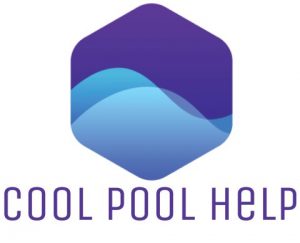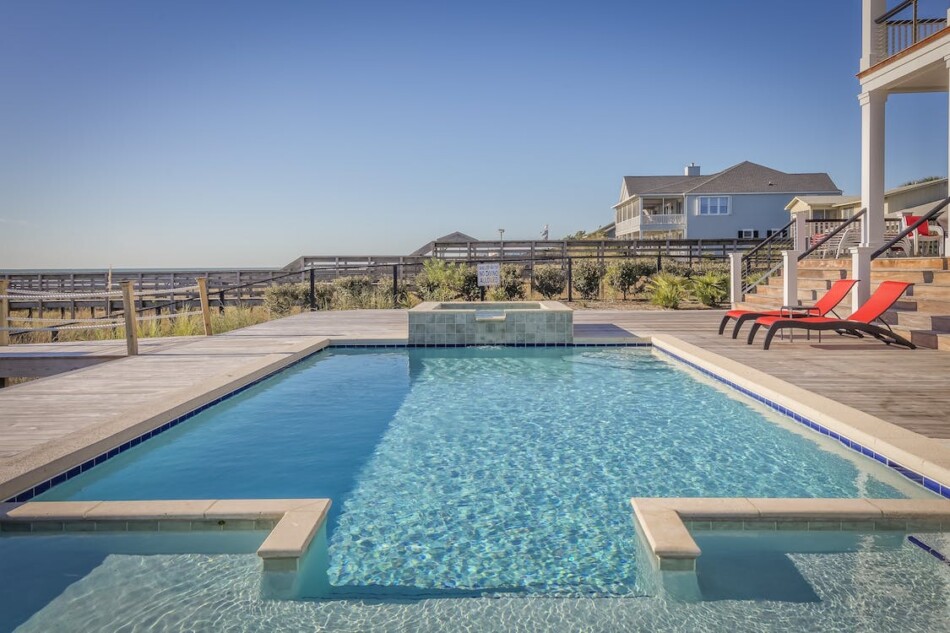Choosing the correct size pool for your backyard is a huge decision and one that you can’t take back after it’s been done. It’s one of the first steps in the pool planning process before you buy or build your new pool. That’s why I created this huge resource of inground pool sizes for homeowners to get a better understanding of what size is right for their homes.
Inground Pool Sizes can vary quite a bit but they will start at 10 ft by 10 ft and can really go much larger. The average biggest-sized pool is 20 ft by 40 ft. and around 800 sq. ft. They can be much bigger obviously as you can see in commercial properties but we will keep this guide dedicated to residential properties and the average sizes the best we can.
Average Inground Pool Sizes and Dimension: What is everyone building today?
If you are looking for the average then that would be a 14’x28′ pool at 392 sq. ft. with a depth of 3.5 ft. to 5 ft. and a water capacity of 12,500 gallons. This depth would make this a relaxation pool with a focus on games, hanging out, and lounging. This size pool is not suitable for diving.
The average was different 20 years ago with more homeowners having larger diving pools but the trend in recent years has been for reduced size and depth recreational pools. This lowers the upfront purchase and installation cost plus reduces annual upkeep costs for chemicals and heating.
There are a ton of options for pools at around this size from Vinyl-Liner, Fiberglass, and Custom concrete pools that range in different shapes. But the above figures are just to give you an idea of what the national average size is today.
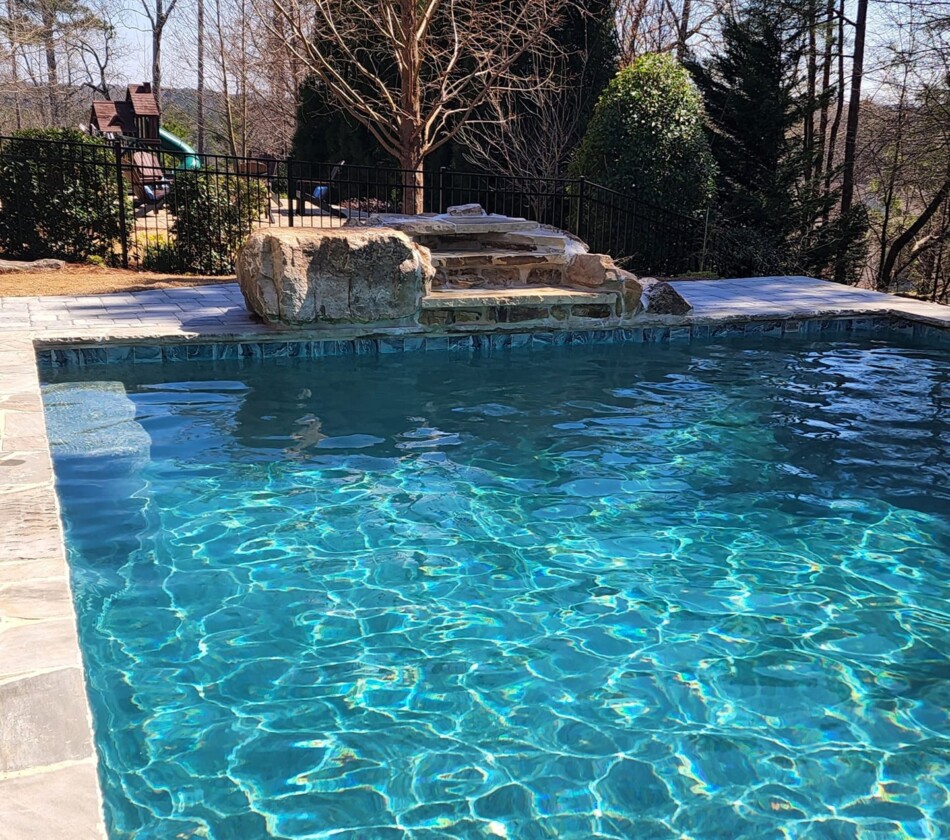
Standard Pool Sizes: List of Most Common Inground Pool Sizes
If you are choosing to build a concrete pool, then the world is your oyster as far as inground pool sizes and shapes are concerned. You could literally build a giant pool shaped like the dollar sign if you want but typically most of us aren’t that rich. I’ve compiled a list of average pool sizes for a rectangular-shaped pool to give you an idea of what the standard pool sizes are for most homeowners. This will give you a bit of a base to work from as you are deciding.
The table below assumes a depth of 3.5 ft. – 5 ft. for a recreational pool.
| # of People | Width ft. | Length ft. | Sq. ft. | Gallons |
|---|---|---|---|---|
| 3 | 12 | 24 | 288 | 10,300 |
| 5 | 16 | 32 | 512 | 18,200 |
| 6 | 18 | 36 | 648 | 23,100 |
| 7 | 20 | 40 | 800 | 28,500 |
| 8 | 22 | 44 | 968 | 34,400 |
| 10 | 24 | 48 | 1152 | 41,000 |
| 11 | 26 | 52 | 1352 | 48,100 |
This next table assumes a depth of 3.5 ft. – 9 ft. deep for a diving pool. I have removed the two smaller-sized pools on the above table because typically you won’t be able to build a pool deep enough if you don’t have the added length.
| # of People | Width ft. | Length ft. | Sq. Ft. | Gallons |
|---|---|---|---|---|
| 6 | 18 | 36 | 648 | 30,300 |
| 7 | 20 | 40 | 800 | 37,500 |
| 8 | 22 | 44 | 968 | 45,300 |
| 10 | 24 | 48 | 1152 | 53,900 |
| 11 | 26 | 52 | 1352 | 63,300 |
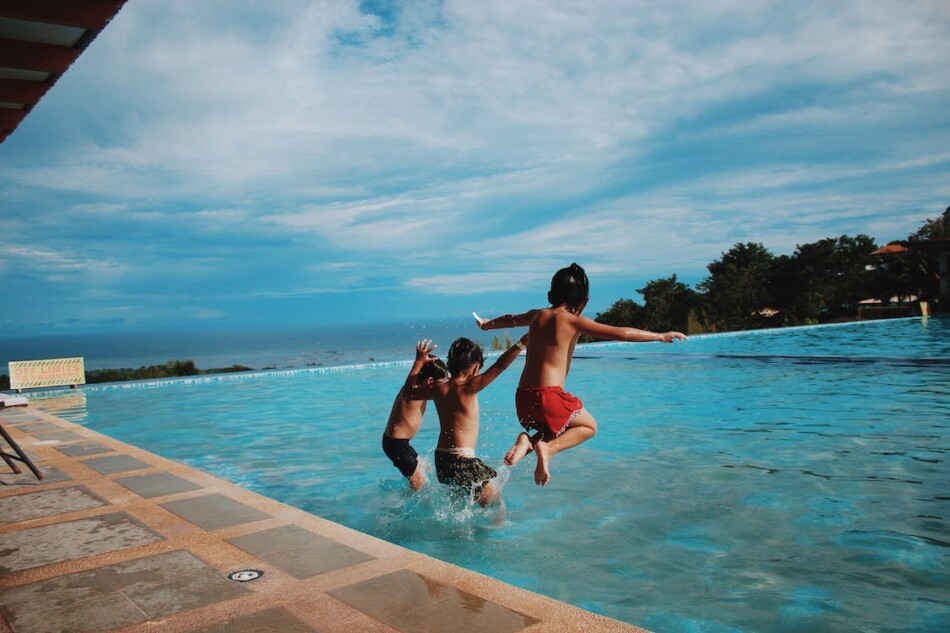
Pool Depth: Most Common Depths and Benefits
The most popular pool depth around the world is 4 ft. deep on average. This is the best depth for recreational usage while still being deep enough to swim laps. The pool I swim in every day is actually a 4ft deep pool with a flat bottom so the depth is consistent throughout the entire pool. Honestly, it’s perfectly suitable for exercise, but for just hanging out in the pool, I would love something a bit deeper so that I can tread water a bit. That would keep me in the pool longer after my workouts.
Pools are broken into two different groups by their depth. The first group is recreational pools that do not reach 8 ft. deep and are not suitable for diving. The second group is deeper pools at a minimum of 8 ft. deep to accommodate diving, I tend to personally think that 7 ft deep pools are no longer recreational pools but technically they aren’t diving pools either. You can read more about the required depths for diving.
All Pools start with a shallow end of the pool at an average of 3.5 ft. but the most popular pool depths are:
- 5 feet (Recreational Pool)
- 6 feet (Recreational Pool)
- 7 feet (Recreational Pool)
- 8 feet (Diving Pool)
There is a range of pool bottoms and how they are formed from Flat, Sloped, Spooned, and U-shaped. Your pool builder will help you in deciding what type of bottom will be best, some of these will be out of necessity due to the length you choose for the pool. For example, a spooned bottom would help you reach a deeper depth on a shorter-length pool. You can see what that looks like in the image below.
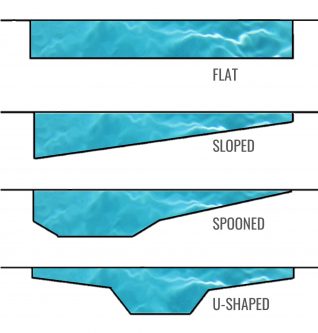
This brings me to the most important factors in choosing your pool depth:
- Who will be using the pool now and 10 years from now?
- It’s important to consider your family today but also what that family looks like in the future. As they grow up and have kids of their own. Inground pools are a long-term commitment.
- What are their swimming abilities?
- Anecdotally you see many stories of families who got their pool and their kids become expert swimmers over the course of their first summer with the pool. There are other people to keep in mind though if you will be hosting extended family and friends often. Is Grandma scared of having water over her head? Are your best friends’ children good swimmers or hyperactive children that will be trying to dive headfirst into the pool even though you tell them not to?
- What will people want to do in the pool the most?
- This is actually quite difficult to give advice on because every family and friend group is so different. It’s well-known in the pool industry that most first-time pool owners make the mistake of building too much deep end and not enough shallow end. My thoughts on the matter have changed over time though, and I do feel that having at least some deep end for jumping is important, and even if your pool isn’t a diving pool, a little bit of extra depth can help prevent accidents for those who don’t obey the rules of no head-first diving.
From what I have learned, bigger in this case might actually be better when it comes to your pool build. If you have the space, being able to have a large shallow end with a smaller amount of sq. ft. dedicated to a deep end that goes to at least 7 feet deep might be the best option. You won’t be able to have a diving board, but it could help prevent some accidents from happening and give you a deep end to place jumping rocks.
I appreciate this quote, it’s short and sweet.
20×40…..9 ft deep end, wouldn’t want it any shallower, the kids like to dive!
Facebook User, First Time Pool Owners Group
Kids like to dive and it might be best to give them a place deep enough to do that. This provides some peace of mind for parents knowing that the pool is deep enough to prevent accidents because kids are always going to be kids and not listen when their back is turned.
Biggest and Smallest Viny-Liner Pool Sizes with Cost
I compiled a list of the standard inground pool sizes available for Vinyl liner pool kits with the price. This will give you an idea of the cost of your pool kit based on the size of your pool. Vinyl liner pools are able to be customized which is the reason they are chosen over fiberglass pools in some cases
| Inground Pool Sizes | Depth Ft. | Shape | Price |
|---|---|---|---|
| 12’x20’ | 6’ | Rectangle | $8,600.00 |
| 14’x28 | 5’8” | Oval | $9,205.00 |
| 12’x20’ | 6’ | Kidney | $9,475.00 |
| 15’x34x22’ | 8’ | Lagoon | $11,840.00 |
| 18’x36’x6” | 8’ | Mountain Lake | $11,090.00 |
Fiber Glass Pool Sizes with Average Cost
Here is an additional list of fiberglass inground pool sizes and costs. Fiberglass pool sizes are not able to be customized, they are manufactured and installed as is.
The cost for the pool shell itself isn’t readily available but the average is between $10,000 – $25,000 depending on location, size, and brand. You have to call each dealer directly and discuss it with them but I compiled this list from evidence found online from homeowners who had pools built.
| Inground Pool Sizes | Shape | Avg. Price w/Installation |
|---|---|---|
| 10’x20’ | Rectangular | $23,400 |
| 15’x30′ | Rectangular | $52,600 |
| 16’x32′ | Rectangular | $59,900 |
| 16’x40′ | Rectangular | $74,800 |
| 18’x43′ | Rectangular | $90,500 |
| 20’x40′ | Rectangular | $93,600 |
Can you give me Concrete inground Pool Sizes with the Cost?
I can’t, unfortunately, because concrete pools are so variable on location, builder, and what you have chosen to customize. I will give some tips though.
Adding depth and size to your pool isn’t typically going to cost you a whole lot more. The true cost of inground concrete pools doesn’t come from size but rather from the difficulty of the shape and features that are added onto these pools. You could build a plain giant-sized concrete pool for the same price as a much smaller-sized concrete pool with a more detailed shape and a lot more features.
Also, if you are limited in space or have a funny-shaped yard, a concrete pool can be the way to go for getting the biggest pool size out of your yard. The customization available to you from a concrete pool is limitless as mentioned above.
Final Thoughts about Choosing the Pool Size For Your Home
As mentioned, it’s a huge decision and you can begin to do a bit of the preliminary work yourself by marking out the inground pool sizes and dimensions mentioned in this article. This will help your decision-making process by determining at first, what is even possible.
The next step is going to be contacting a pool builder that will be able to check out your backyard and give you a better idea of what inground pool sizes are even available to fit in your space because of other factors like underground pipes, electrical wires, and possible irrigation requirements you’ll have to meet. I wish you the best of luck! Getting a new pool for your home is extremely exciting and be sure to check out the rest of the blog for other information that can hopefully help you before and after you have that new pool!
